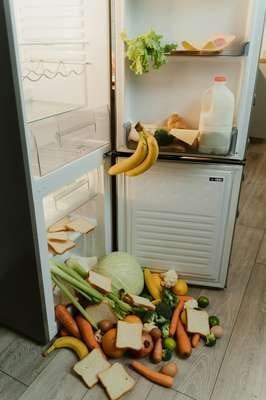Experts expose the hidden dangers in your fridge - Stop wrapping your leftovers like this now!
By
Danielle F.
- Replies 16
As members of the Seniors Discount Club, we're always on the lookout for savvy tips to make our lives easier and healthier. But sometimes, the habits we've developed over the years might not be serving us as well as we thought. Today, we're delving into the kitchen – a place where we all spend a considerable amount of time preparing and storing food. It turns out, there's a common practice that could be putting our health at risk: wrapping leftovers in aluminium foil.
Dr Zachary Cartwright, a food scientist with Aqualab in Chicago, has raised the alarm on this everyday habit. According to Dr Cartwright, using aluminium foil to store food in the fridge is a no-go. The reason? It doesn't create an airtight seal, which is crucial for keeping dangerous bacteria at bay. These pathogens, such as Staphylococcus aureus and Bacillus cereus, thrive on oxygen, and without a proper seal, they can multiply and produce toxins that lead to food poisoning – something we all want to avoid.
Now, you might be thinking, 'But I've been using foil for years without a problem!' While it's true that aluminium foil has been a kitchen staple for decades, replacing the less durable tin foil, it's not without its pitfalls. Not only does it fail to protect food adequately, but it can also react with acidic and salty foods, potentially leaching into your meals. Over time, aluminium intake has been linked to various health concerns, including neurotoxic developmental disorders and damage to vital organs.
So, what should we be using instead? The experts suggest turning to Tupperware containers, seal-able plastic bags, or even cling film as safer alternatives. These options can create the airtight conditions needed to prevent microbe growth and keep your leftovers fresh and safe to consume.
Primrose Freestone, a senior lecturer in clinical microbiology at the University of Leicester, echoes the importance of proper food storage. She warns that even at typical fridge temperatures, some pathogens can continue to grow, which is why freezing leftovers might be a better option. Freezing at minus 20°C halts the growth of food poisoning bacteria, giving you peace of mind and more flexibility with your meal planning.
When it comes to storing leftovers, here are some additional tips to ensure your food remains safe to eat:

We'd love to hear from you, our dear members. Have you ever experienced any issues with food storage? What are your go-to methods for keeping leftovers fresh? Share your thoughts and tips in the comments below, and let's continue to learn from each other's experiences. Stay safe and healthy in the kitchen!
Dr Zachary Cartwright, a food scientist with Aqualab in Chicago, has raised the alarm on this everyday habit. According to Dr Cartwright, using aluminium foil to store food in the fridge is a no-go. The reason? It doesn't create an airtight seal, which is crucial for keeping dangerous bacteria at bay. These pathogens, such as Staphylococcus aureus and Bacillus cereus, thrive on oxygen, and without a proper seal, they can multiply and produce toxins that lead to food poisoning – something we all want to avoid.
Now, you might be thinking, 'But I've been using foil for years without a problem!' While it's true that aluminium foil has been a kitchen staple for decades, replacing the less durable tin foil, it's not without its pitfalls. Not only does it fail to protect food adequately, but it can also react with acidic and salty foods, potentially leaching into your meals. Over time, aluminium intake has been linked to various health concerns, including neurotoxic developmental disorders and damage to vital organs.
So, what should we be using instead? The experts suggest turning to Tupperware containers, seal-able plastic bags, or even cling film as safer alternatives. These options can create the airtight conditions needed to prevent microbe growth and keep your leftovers fresh and safe to consume.
Primrose Freestone, a senior lecturer in clinical microbiology at the University of Leicester, echoes the importance of proper food storage. She warns that even at typical fridge temperatures, some pathogens can continue to grow, which is why freezing leftovers might be a better option. Freezing at minus 20°C halts the growth of food poisoning bacteria, giving you peace of mind and more flexibility with your meal planning.
When it comes to storing leftovers, here are some additional tips to ensure your food remains safe to eat:
- Label and date your containers: This helps you keep track of when the food was stored and ensures you eat it within a safe timeframe.
- Consume leftovers within two days: If you can't eat them within this period, consider freezing them for later use.
- Trust your senses: If you notice any unusual smells, textures, or signs of mould, it's better to err on the side of caution and discard the food.
- Reheat properly: Ensure leftovers are reheated to a safe internal temperature to kill any bacteria that may have developed.
Key Takeaways
- Four key takeaways from this article (using Australian grammar and spelling) are:
- An expert has warned against using aluminium foil to store leftovers due to the risk of dangerous bacteria growth and potential for the foil to react with certain foods.
- Dr Zachary Cartwright, a food scientist, suggests using airtight containers such as Tupperware or seal-able plastic bags to keep leftovers in the fridge to prevent microbial growth.
- Improper storage of food in aluminium foil can increase the risks of food-borne illnesses from bacteria like Staphylococcus, Bacillus cereus, Clostridium botulinum, and Listeria monocytogenes.
- Primrose Freestone, a senior lecturer in clinical microbiology, advises storing and reheating leftovers correctly to avoid potentially life-threatening food poisoning and suggests labelling containers with dates for safer consumption within two days or opting for freezing.








